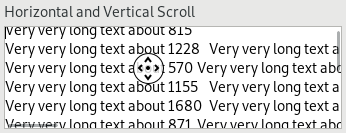Platform Changes
To mark an element as transient simply call
uiElement.getPersistedState().put(IWorkbench.PERSIST_STATE, "false");
unset is now supported as CSS value and is mapped to the Java value null.
For example, when used for the background-color property, the
widget will revert to the specific native look, if it has one, or inherit the background from the parent widget.
GridLayoutFactory and GridDataFactory i.e. a fluent, re-usable API.
The entry point is WidgetFactory.
For example, to create a button:
WidgetFactory.button(SWT.PUSH).text("Click me!").onSelect(event -> buttonClicked(event).create(parent);
This is a work in progress and more factories will follow soon.
org.eclipse.ui.ide.markerHelp extension point now allows to specify a help context provider instead of a static help context.
This example shows how to specify such a help context provider
<extension
point="org.eclipse.ui.ide.markerHelp">
<markerHelp
helpContextProvider="org.eclipse.ui.ExampleContextProvider"
markerType="ExamplePlugin.custom_marker">
</markerHelp>
</extension>
The class needs to implement org.eclipse.ui.IMarkerHelpContextProvider.
SWT Changes
StyledText widget now supports mouse navigation scrolling similar to most web browsers.
When enabled, a StyledText widget can be scrolled by clicking the mouse's scroll wheel,
and then moving the mouse. Clicking the scroll wheel again cancels the scrolling, and returns
the widget to its default state.
To enable mouse navigation, simply call:
StyledText.setMouseNavigatorEnabled(true);
